Jesus meets his mother
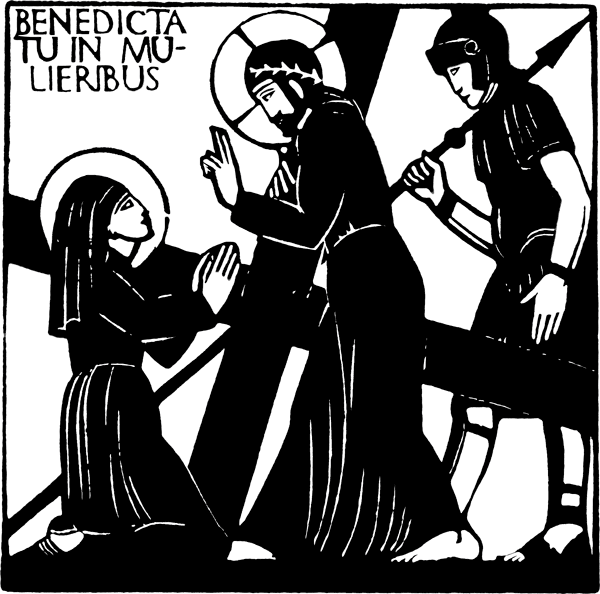
Mary
“O my son, my dear son. It was agony to see you suffering like this. How many mothers have seen their children suffer? I knew what it was like. We, my friends and I, had waited outside the governor’s palace, waiting for you to be freed. And then the soldiers forced you out, carrying a cross. Before they could stop us we ran past them and hugged you. Why was this happening to you? Why? Surely you could have said something, done something, and it would have stopped? Even now? But as he looked at me, I knew this would not happen — I felt as if a sword had pierced my heart.”
Prayer
Lord Jesus, your mother Mary wept at your torment:
give heart to all parents who watch their children suffer.
Your mother felt your pain in her heart:
guide us to bring the fullness of life to children and parents.
To you, Jesus, Son of God and Son of Mary,
be honour and glory with the Father and the Holy Spirit,
now and for ever.
Amen.
illustration: from a wood-engraving by Eric Gill, 1917
4 CommentsJesus falls the first time
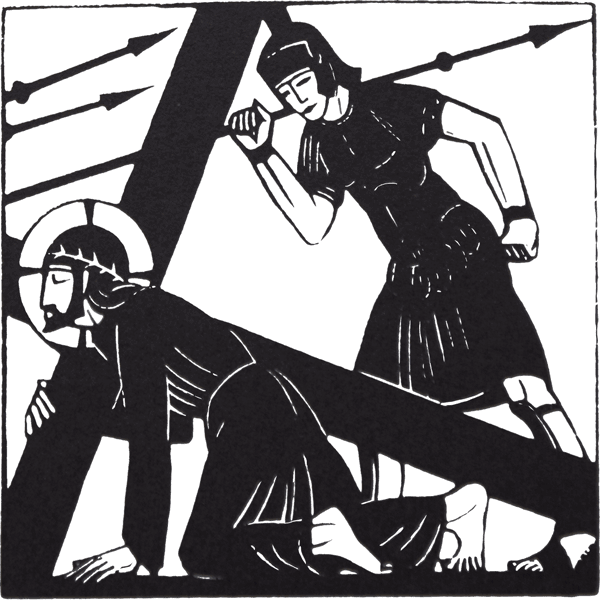
a woman
“I was standing outside the governor’s palace. It was just before Passover and a crowd had gathered to see if the governor would release any prisoners. We’d cheered the news that Barabbas was to be freed. But then the soldiers came out with some other men, taking them to be executed. They were each carrying their crosses, but this one was already weak. The weight of what he was carrying seemed crushing. He lurched towards us, and he stumbled right in front of me. The soldiers were straight in with their spears; they picked up the cross, dragged him to his feet, and carried on.”
Prayer
Lord Jesus, you suffered like us under the burdens of this world:
be with those whose strength is taken away by ill-treatment or illness.
You are present in our suffering and share our loads:
help us to let you carry our burdens.
To you, Jesus, falling under the weight of the cross,
be honour and glory with the Father and the Holy Spirit,
now and for ever.
Amen.
illustration: from a wood-engraving by Eric Gill, 1917
1 CommentJoe Cassidy
It is with much sadness that we have learned that the Revd Canon Joe Cassidy died yesterday, 28 March, after a short illness. He was 60.
Joe was a frequent commenter on this Thinking Anglicans blog, and also a valued contributor to our ‘just thinking’ series, writing challenging and pastoral pieces from a sound scholarly position. In the wider world he was the Principal of St Chad’s College, Durham, a place where many of our clergy have trained and where he will be much missed. Before joining the Church of England he had been ordained priest in the Roman Catholic Church, and was a member of the Society of Jesus, the Jesuits, in his native Canada.
The Dean of Durham, Michael Sadgrove, was his neighbour in the city, and has written this personal reminiscence.
To his wife Gillian and to his children and family we send our condolences.
May he rest in peace!
Simon, Simon and Peter
8 CommentsJesus takes up his cross
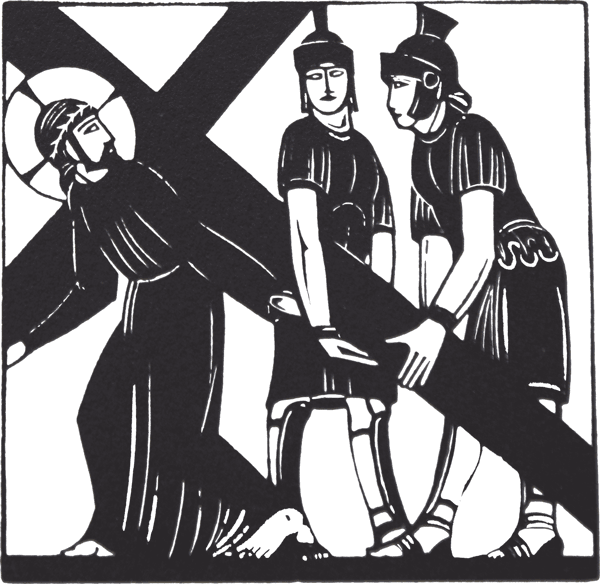
a soldier
“I was a soldier in Pilate’s guard on duty that day. Once Pilate had passed the sentence of death it was our job to carry it out. So we marched him out from Pilate round to our courtyard. That’s where we used to have our bit of fun: we dressed him up and mocked him and spat at him, and some of my mates roughed him up a bit. Then we got out a cross for him. He knew that he had to carry it, but he didn’t seem strong enough to carry that weight. But with our spears and swords, he had no choice.”
Prayer
Lord Jesus, you carried the cross through the rough streets of Jerusalem:
be with those who are loaded with burdens beyond their strength.
You bore the weight of our sins when you carried the cross:
help us to realize the extent and the cost of your love for us.
To you, Jesus, bearing a cross not your own,
be honour and glory with the Father and the Holy Spirit,
now and for ever.
Amen.
illustration: from a wood-engraving by Eric Gill, 1917
0 CommentsPilate condemns Jesus to death
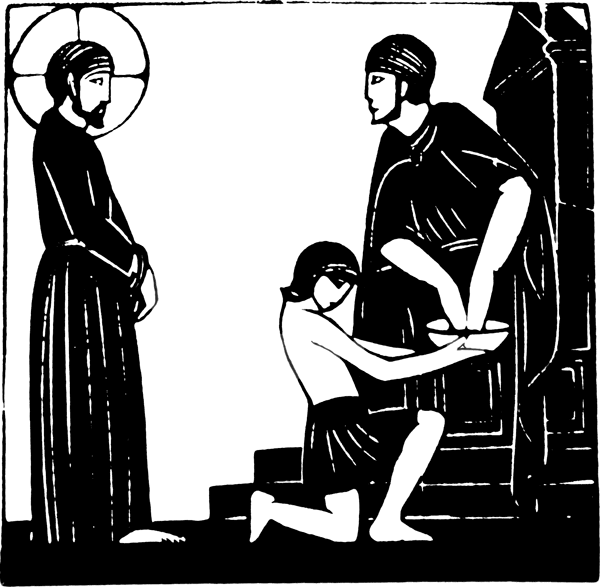
a young slave
“I was a slave in Pilate’s household in Jerusalem. There were lots of people there, jostling and pushing, and over to one side were the Jewish priests, keeping themselves separate. Pilate wanted some water and I was sent for it. I brought in a bowl and a towel and he dipped his hands in the bowl and dried them on the towel. That’s what I remember. Then Pilate said, ‘Take him away and crucify him!’ Only then did I see him — standing, shackled in front of Pilate. I wondered what he had done.”
Prayer
Lord Jesus, you were condemned to death for political expediency:
be with those who are imprisoned for the convenience of the powerful.
You were the victim of unbridled injustice:
change the minds and motivations of oppressors and exploiters
to your way of peace.
To you, Jesus, innocent though condemned,
be honour and glory with the Father and the Holy Spirit,
now and for ever.
Amen.
illustration: from a wood-engraving by Eric Gill, 1917
6 CommentsBishop of Gloucester
Updated
10 Downing Street has announced that the next Bishop of Gloucester is to be the Venerable Rachel Treweek, currently Archdeacon of Hackney.
Diocese of Gloucester: Venerable Rachel Treweek
The Queen has approved the nomination of the Venerable Rachel Treweek, BA, BTh, Archdeacon of Hackney, for election as Bishop of Gloucester in succession to the Right Reverend Michael Francis Perham, MA, whose resignation took effect on the 21 November 2014.
Notes for editors
The Venerable Rachel Treweek (nee Montgomery) aged 52, studied at Reading University and trained for the ordained ministry at Wycliffe Hall, Oxford. She served her first curacy at Saint George and All Saints, Tufnell Park in the Diocese of London from 1994 to 1997 and was Associate Vicar from 1997 to 1999.
From 1999 to 2006 she was Vicar at Saint James the Less, Bethnal Green and Continuing Ministerial Education Officer for the Stepney Episcopal Area. From 2006 to 2011 she was Archdeacon of Northolt in the Diocese of London. Since 2011 she has been Archdeacon of Hackney. In 2013 she was elected as Participant Observer in the House of Bishops for the South East Region.
Rachel is married to Guy, Priest-in-Charge of two parishes in the City of London.
Her interests include conflict transformation, walking and canoeing.
Gloucester diocese has a page welcoming the new bishop-designate including the following quote
Following the announcement, Rachel said:
“It is an immense joy and privilege to be appointed as the Bishop of Gloucester. I am surprised and, I have to admit, even a little daunted by the prospect, but my overwhelming feeling is one of excitement to be coming to join with others in sharing the love of Jesus Christ with the people of this diocese.
“I am looking forward to encouraging Christians to speak out with confidence about their faith and the good news that the Gospel brings. It will be my privilege to work with churches as we connect with people, wherever they are and whatever their concerns.
“My calling to the role of bishop has been shaped by human encounter. I believe profoundly that relationship is at the heart of who God is. I have been with people through the joys and pains of their lives and it is these experiences that I will reflect upon as I take up this new role.”
The diocese of London also covers the appointment of one of its archdeacons. The Bishop of London, Richard Chartres, is quoted:
As Richard of Gloucester is reinterred, Rachel of Gloucester is revealed. Rachel has served her entire ministry in the Diocese of London, excelling wherever she has been. She has twice acted as Archdeacon, in Northolt and then Hackney — two highly demanding and contrasting areas where she has shone in equal measure.
… While we are very sorry to see her go, Gloucester has appointed someone with real quality and distinction. We look forward to continuing to support her in the years to come.
There is also coverage in the press including
several of which note that she is expected to become the first woman bishop to sit in the House of Lords.
31 CommentsAmending Canon No 33
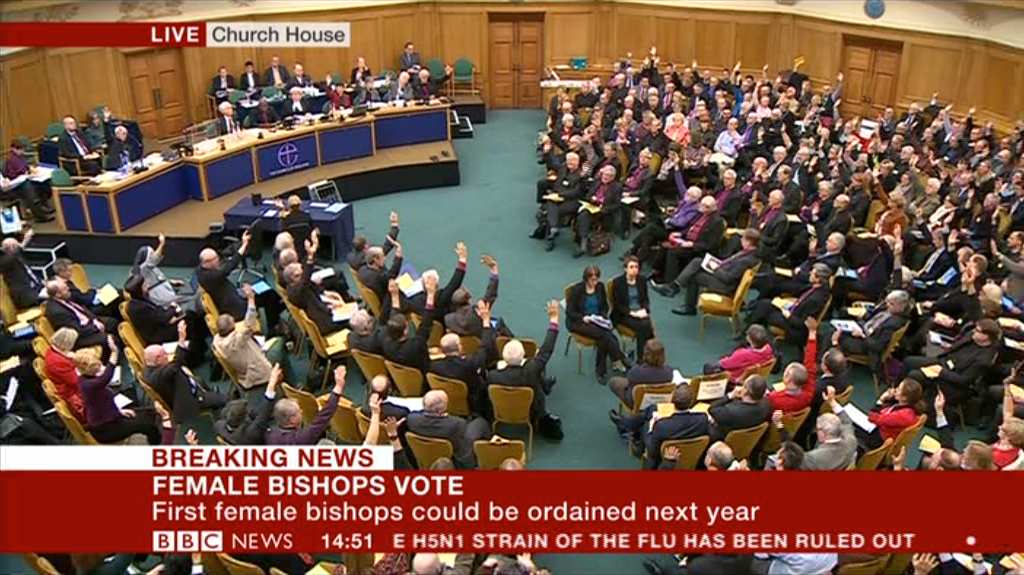
The General Synod of the Church of England has today, by clear show of hands, passed a motion enacting Amending Canon No 33. The effect of the amendment is to enact that:
4 CommentsA man or a woman may be consecrated to the office of Bishop.
suffragan Bishop of Burnley
Updated
It has been announced from 10 Downing Street this morning that the Revd Philip North is to be the next Bishop of Burnley in the diocese of Blackburn:
The Queen has approved the nomination of the Reverend Philip John North, MA, Team Rector of the Parish of Old Saint Pancras, in the Diocese of London, to the Suffragan See of Burnley, in the Diocese of Blackburn, in succession to the Right Reverend John William Goddard, BA, on his resignation on 31 August 2014.
A press release from Forwad in Faith comments:
Forward in Faith is delighted at the news that Fr Philip North is to be the next Bishop of Burnley, in succession to Bishop John Goddard.
Fr North is well known for his pastoral gifts, his zeal for mission and evangelization, and his commitment to the proclamation of the Gospel, especially amongst the poor.
We are proud to welcome a new episcopal member of Forward in Faith, and we pray for Fr North as he prepares for his move, and for the whole people of God in the Diocese of Blackburn.
Update (Friday afternoon)
Blackburn diocese is now also carrying this news: next Bishop of Burnley to be the Reverend Philip North and quoting the bishop-designate:
“Some of you might be aware that I withdrew from an appointment as Bishop of Whitby. The fact that I have been invited and have agreed to serve as a Bishop again is testimony to the very different mood across the Church of England since the understandable disappointment that followed the failure in 2012 of the legislation to enable women to be bishops.
“The Church has stated afresh its commitment to enabling all traditions to flourish within its life and structures, and I hope that my appointment will be seen as evidence of that pledge.”
And the Bishop of Blackburn, Julian Henderson, is quoted:
83 Comments“I want to make it clear that I see Philip’s appointment as a clear sign the Anglican Church in Lancashire is living out these five guiding principles.
“I wanted to have an episcopal colleague who is from the traditionalist catholic constituency and Philip fulfils that role well. He comes to serve the whole Diocese. He will also have particular care for those people who cannot accept the ministry of women as Bishops and Priests in the Church — and he will have my wholehearted support in carrying out this important work.”
Bishop of Gloucester
The investigation into allegations against the Rt Revd Michael Perham, Bishop of Gloucester, has been dropped.
BBC News reports that The Bishop of Gloucester is to face no further action by police over two allegations of indecent assault.
The Gloucestershire Citizen also carries the story here with slightly more detail:
A statement from Bishop of Durham, Rt Revd Paul Butler, Lead Bishop on Safeguarding for the Church of England said: “We can confirm that we have been notified by the Metropolitan Police that following enquiries they are to take no further action regarding the allegations made against the Rt Revd Michael Perham, Bishop of Gloucester.
…
“We would ask for continuing prayers for all of those affected by these events and those involved in ongoing processes.“
Bishop Michael said: “It was right that the allegations should be fully investigated and I am gratified that the police have completed the investigation and concluded that there are no grounds for further action to be taken
“My family and I are profoundly grateful for all the support and affirmation we have received through this very difficult time.”
Bishop Michael will not yet return to his post until due church processes have been concluded.
However he hopes the process will conclude in time for him to return to his post before he is due to retire as planned in November. https://australiacasinoonline.com/5-dollars-minimum-deposit-casinos-australia/
We earlier reported the news that Bishop Michael was ‘stepping back’ from his role in the diocese of Gloucester, pending his retirement in November.
7 CommentsBishop of Gloucester steps back
Updated Friday morning
It was reported on Saturday that the Bishop of Gloucester, Michael Perham, who was due to retire later this year, was to step back ‘for personal reasons’ with immediate effect. It has now been confirmed that he has today been interviewed by Gloucestershire Police in connection with two alleged incidents of indecent assault in the early 1980s. He has not been arrested and was not charged. One incident concerns a woman aged over 18 at the time, and the other a woman under 18 at the time.
Further coverage in
The Bishop of Tewkesbury, the Rt Revd Martyn Snow, will act as bishop.
UPDATED Wednesday evening with other reports. There is little or no extra information in any of these stories.
- The Times (subscription required)
Updated again Friday
The Bishop of Tewkesbury has published this letter on the diocesan website.
0 CommentsGood Neighbours
The Church Urban Fund and Theos yesterday published a report Good Neighbours: How Churches Help Communities Flourish. From the press release:
10 million rely on church community, new research shows
New research conducted for Church Urban Fund, shows that 10 million adults a year use community services provided by churches and church-run organisations. This is more than half of all those who access these services. The wide range of support includes food banks, luncheon clubs and night shelters along with relationship courses, financial advice and access to computers and the internet.
In a foreword to the Church Urban Fund/Theos report Good Neighbours: How Churches Help Communities Flourish, launched yesterday in the House of Lords, the Archbishop of Canterbury, Justin Welby said: “This report demonstrates the scale and nature of that love for neighbour in practical action. It shows that relationships are at the heart of every community, and that churches are at the heart of local communities. It shouldn’t come as a surprise to anyone that the Church is part of the solution for building community blessing at every level.”
The full report and an executive summary can be downloaded from the Church Urban Fund website here.
In this new piece of research, Church Urban Fund and Theos set out to understand the impact of local churches in deprived communities in England. We sought to explore what churches do to support people in their communities, and also how and why they do it.
This research project is a ‘critical appreciation’ of what churches offer their communities – it argues that church-based activities offer both breadth of national reach and depth. It shows that:
- The Church in England reaches approximately 10 million people each year through its community activities, even excluding ‘familiar’ church activities – Sunday services, Christmas, Easter, Harvest, baptisms, weddings, and funerals.
- Churches reach people in a uniquely relational way, building platforms for neighbourliness and relationships to grow.
Thinking Liturgy
Today we are launching a new blog in the Thinking Anglicans family. Called Thinking Liturgy, it will focus on the link between the way that we worship and the social justice that we proclaim. Here on the main TA blog we have focussed largely, though not exclusively, on issues of social justice, and that will continue.
Thinking Liturgy will cover a range of liturgical topics and news, not confined to any particular theological or doctrinal stance or ‘churchmanship’, though it will be largely Anglican and English. It will promote good liturgical practice and understanding — not for its own sake, but looking at the impact liturgy makes on working for the kingdom.
We hope that many of you will read this new blog, and contribute to a lively liturgical discussion. Read more at Thinking Liturgy.
1 CommentWells Palace: diocese objects
Updated Monday evening
In the continuing saga of the Bishop’s Palace at Wells (previous episode here), the Bishop’s Council of the diocese of Bath & Wells has formally objected to the Church Commissioners’ decision to house the Bishop elsewhere.
A news story on the diocesan website states:
At a special meeting on Tuesday 18 March, members of the Bishop’s Council of the Diocese of Bath & Wells unanimously agreed to lodge a formal objection against the Church Commissioners’ decision to move the Bishop of Bath & Wells out of the Palace in Wells and into temporary accommodation in Croscombe.
A spokesman for the Diocese says: “On 27 February this year we were given official notice by the Church Commissioners about their decision to move the Bishop to The Old Rectory in Croscombe. We were advised of our right to object within 28 days and we are taking the opportunity to do so. We now await the outcome.”
Update
The Church Commissioners have issued this statement:
6 CommentsStatement from Church Commissioners on Wells Palace
24 March 2014
The Church Commissioners have received from the Bishop’s Council of the Diocese of Bath and Wells a formal objection to the proposal to move the residence of the Bishop of Bath and Wells from Wells Palace to Croscombe.At a meeting of a committee of the Board on 21st March it was agreed to forward the objection to the Archbishops’ Council of the Church of England who will in due course rule on the matter.
The Commissioners welcome the opportunity to present their case to the Council.
Women in the Episcopate – diocesan synod votes 3
Seven more diocesan synods voted on the Women in the Episcopate legislation today: Bath & Wells, Birmingham, Bradford, Lichfield, Liverpool, Oxford and Peterborough.
We await the results from Bath & Wells, but the motion was approved by large majorities in the other dioceses.
We await precise voting figures from Lichfield, but t The motion was approved in all seven synods.
So far 20 dioceses have voted in favour and none against. At least 23 dioceses must vote in favour if the draft legislation is to return to General Synod in July.
The next diocesan synod votes will be on 29 March in Bristol, Hereford, Lincoln, Norwich and Portsmouth. If approved by those synods it will have passed the threshold of more than half the dioceses, guaranteeing its return to the General Synod.
Detailed voting figures for all dioceses are here.
5 Commentsnew Bishop of Leeds announced
It has been announced this morning from 10 Downing Street that the first Bishop of Leeds, serving the new diocese in West Yorkshire and the Dales, is to be the outgoing Bishop of Bradford, the Rt Revd Nick Baines.
The press release from Number 10 reads:
The Queen has approved the nomination of the Right Reverend Nicholas Baines, BA, Bishop of Bradford, for election as the new Bishop of Leeds, following the restructuring of the Dioceses of Bradford, Ripon and Leeds and Wakefield into the Diocese of Leeds (West Yorkshire and the Dales).
Biographical notes on Nick Baines appear below the fold.
The website for the proto-diocese carries this story Bishop of Bradford Announced as First Bishop of Leeds for the new Diocese
The Archbishop of York has issued his own lengthy press statement.
Nick Baines has blogged about his own appointment here.
There is a video in which he speaks about this too.
20 CommentsThe heavens are opened
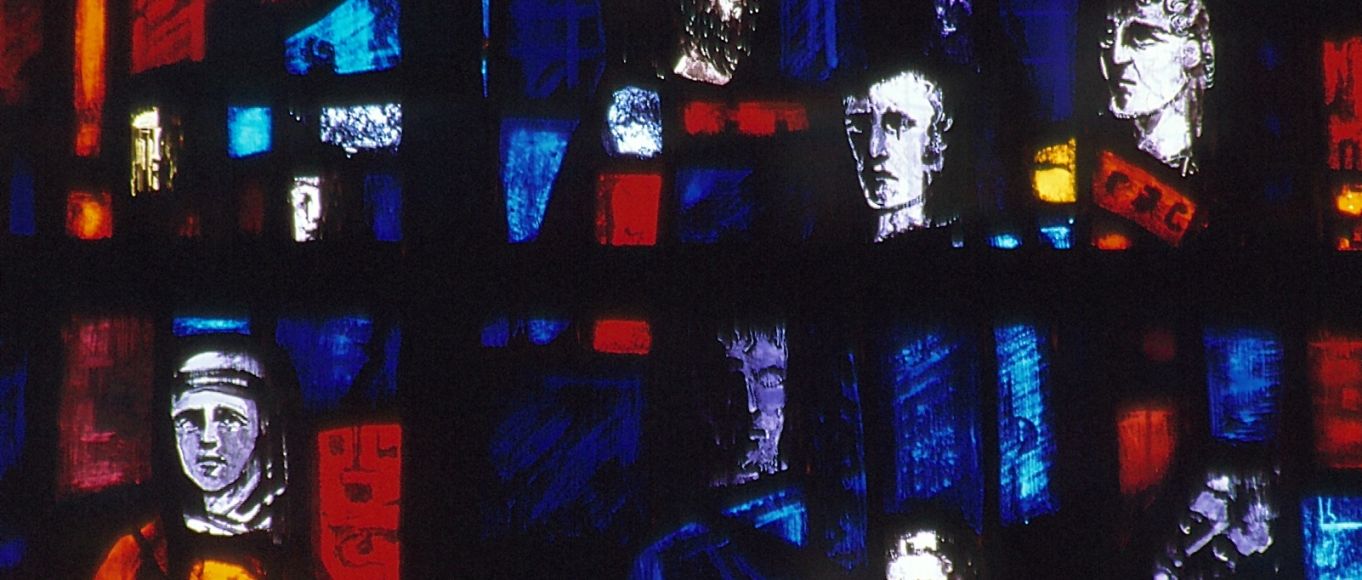
So. We arrive at the Baptism of Christ. We leave behind angels and dreams, shepherds and wise men, stable and census, and with the Baptism of Christ we arrive at history in the life of Jesus. We can be sure, I suggest, of two things: that John the Baptist existed; and that Jesus came and was baptized by him.
The existence and mission of the Baptist is attested not just by the gospels, but also by the Jewish historian Josephus. And Jesus’s baptism is recorded in the gospel according to Mark and that of Matthew; Luke briefly mentions it, and though John manages to get away without any explicit statement, he does relate the build-up and the aftermath.
In the accounts in Mark and Matthew, after his baptism Jesus sees the heavens open and the Spirit descend on him. In Luke the vision becomes an event seen by all; in the fourth gospel the Baptist himself has this vision as a witness to Jesus as Messiah.
Presumably Jesus had heard report of the Baptist and, perhaps with others, travelled out to see and hear him. And having seen and heard he was immersed in the water, just like many of the others who saw and heard. The synoptic gospels tell us this was a moment of great spiritual significance for Jesus. With the vision of the descent of the Spirit, perhaps it is at this point that Jesus decides to abandon his former life as a carpenter in Nazareth. Presumably he becomes a disciple of the Baptist, retreating into the wilderness for reflection and self-examination, and joining John in baptizing in the river Jordan.
And then John is arrested and is incarcerated in Herod’s prison and will soon meet his death at Herod’s whim. He was not the first person to fall victim to the wrath of a tyrant, and nor was he the last. A roll call of victims and prisoners of conscience would number in the tens of millions in the twentieth century alone. The list of current news stories at Amnesty International includes not just all the usual suspects — our own proud western democracies are not always beyond reproach either. The image at the top of this piece shows a detail of the ‘prisoners of conscience’ window at the east end of Salisbury Cathedral, where every day prayers are said for those held around the world. Let us too hold these people in our prayers and work for their freedom and the improvement of their lot. Let the oppressed go free.
Jesus meanwhile ‘withdraws’ (Matthew 4.12) to Galilee — very probably it was no longer safe for anyone linked to the Baptist to be in Herod’s territory. Luke tells us that Jesus’s first public act on his return to Galilee is to read in the synagogue at Nazareth:
The Spirit of the Lord is upon me,
because he has anointed me
to bring good news to the poor.
He has sent me to proclaim release to the captives
and recovery of sight to the blind,
to let the oppressed go free,
to proclaim the year of the Lord’s favour.’
If this is historical, then is it too much to see it as an expectation by Jesus that in this year of the Lord’s favour the captive Baptist will be released — and that this is happening now? Not surprising that his message was not received favourably and he was driven out.
But with the arrest and decrease of the Baptist, it is time for Jesus to increase and to proclaim the year of the Lord’s favour, the imminence of the kingdom of God. A kingdom based not on austerity or retreat to the wilderness but on justice for the oppressed and life in all its fullness. Here we are invited to sit and feast, accepted and welcomed into fellowship with the divine. In the subsequent ministry of Jesus baptism does not seem to be a prerequisite to ritual purity and to acceptance into the society of the ritually pure. Instead Jesus tells people their sins are already forgiven, and he accepts them without further ritual into society with him, sitting at table together and breaking bread.
Is it any wonder that it was these remarkable meals of Jesus that his followers continued — and that they continued to recognize his presence at the breaking of the bread? In this ritual we sit and eat at God’s table, and we break bread with our fellows, forgiving them the wrongs they have done us and receiving their forgiveness for the wrongs we have done them; and as we break bread together we recognize still the presence of Jesus, the incarnate Word.
And this begins with the baptism of Christ: the year of the Lord’s favour is now.
Simon Kershaw is one of the founders of Thinking Anglicans
17 Commentsinterim bishop for St Edmundsbury and Ipswich
It has been announced that the Bishop of Huntingdon (a suffragan see in the diocese of Ely), the Rt Revd David Thomson, is to be the ‘interim bishop’ for the diocese of St Edmundsbury and Ipswich. The See will be vacant as a result of Bishop Nigel Stock’s appointment to the Archbishop of Canterbury’s staff as bishop at Lambeth. Bishop David’s appointment will take effect in October 2013 and will continue until a new diocesan bishop is selected.
An announcement from the diocese of Ely quotes Bishop David as saying, ‘It’s a great privilege to be asked to work as a shepherd for Christ’s people in the diocese of St Edmundsbury & Ipswich as they wait for a new diocesan bishop. I pray that I will be able to help them to continue to grow in faith, deepen in discipleship, and share richly the good things God has given us with the communities we serve.’
The Archbishop of Canterbury, the Most Revd and Rt Hon Justin Welby, said, ‘I am delighted to have commissioned Dr David Thomson, Bishop of Huntingdon, to care for the Diocese of St Edmundsbury & Ipswich during the period until a new diocesan bishop is chosen and arrives. Bishop David combines the gifts of a bishop with long experience as a parish priest and archdeacon.’
The announcement from the diocese of Ely appears below the fold.
20 CommentsAnother Pointless Death?
Just another pointless death. A provincial prophet, a failed rebel, a stirrer-up of trouble is brutally executed by the imperial regime. A story that has been repeated innumerable times before and since. What did he and his followers expect? What did he think he could achieve against the power and privilege of the establishment even in such a minor, far-flung trouble spot? What a waste.
But here we see Jesus of Nazareth continuing to proclaim the kingdom of God. The kingdom of God is near you, among you, he had preached. The kingdom of God exists wherever God’s will is done; a place where the hungry are fed and where each forgives the wrongs done to them by others. A place where that forgiveness is immediately recognized by sitting down and eating together, breaking the barriers.
And this is how Jesus dies: breaking bread with his friends and forgiving those who executed him. Here in this one day (by the reckoning of the ancient world), beginning at sunset on Thursday evening and culminating on a hillside outside the city a few hours later. Here is the epitome of the kingdom.
And so, as Jesus dies on the Cross proclaiming Love, this is no less than the inauguration of the kingdom of God on earth, as it is in heaven.
1 CommentHonest to God at 50
Honest to God, by Bishop John Robinson, was first published in 1963, and has been in print ever since, selling over a million copies. To celebrate this anniversary, the publisher SCM Press is sponsoring a commemorative evening in April at St Martin-in-the-Fields and has assembled a panel to discuss its influence and contemporary resonance.
Free event — everyone welcome
Monday 29 April, 7:00pm
St Martin-in-the-Fields, Trafalgar Square, London WC2N 4JJ
The panel includes popular authors Francis Spufford and Mark Vernon, Archdeacon of Canterbury Sheila Watson, and vicar of St Martin’s the Revd Dr Sam Wells. It will be chaired by BBC World Affairs Correspondent Mike Wooldridge.
More details at stmartin-in-the-fields.org/event/honest-to-god-at-50.
4 CommentsPope Benedict XVI to resign
It was announced from the Vatican this morning that Pope Benedict XVI is to resign with effect from 28 February.
Press reaction has been swift. The new Archbishop of Canterbury, Justin Welby, in a press release, has responded:
In his visit to the UK, Pope Benedict showed us all something of what the vocation of the See of Rome can mean in practice — a witness to the universal scope of the gospel and a messenger of hope at a time when Christian faith is being called into question.
In his visit to the United Kingdom, Pope Benedict showed us all something of what the vocation of the See of Rome can mean in practice – a witness to the universal scope of the gospel and a messenger of hope at a time when Christian faith is being called into question. In his teaching and writing he has brought a remarkable and creative theological mind to bear on the issues of the day. We who belong to other Christian families gladly acknowledge the importance of this witness and join with our Roman Catholic brothers and sisters in thanking God for the inspiration and challenge of Pope Benedict’s ministry.
The Archbishop of York, John Sentamu, writes
… the Christian world will miss a great theologian with great spiritual depth.
63 CommentsWe should remember Pope Benedict communicated the revelation of God in a characteristic way as a true successor of St Peter. He was unafraid to proclaim the Gospel and challenge a culture that is so self-referential, managing to lift our eyes to God’s glory.